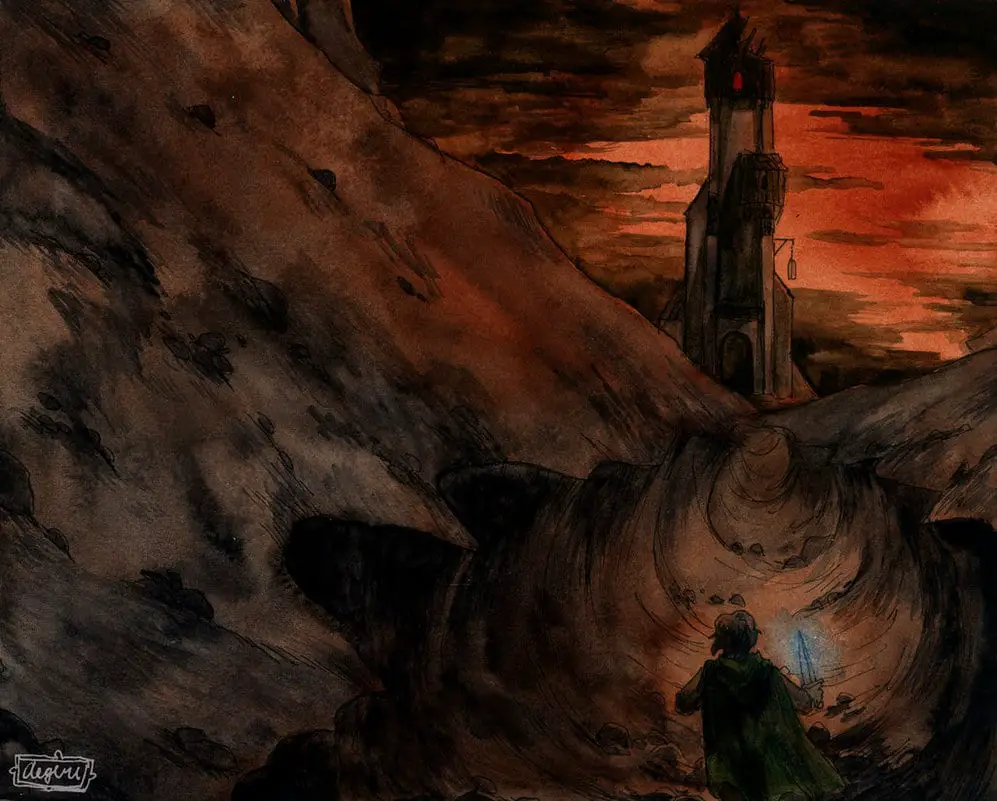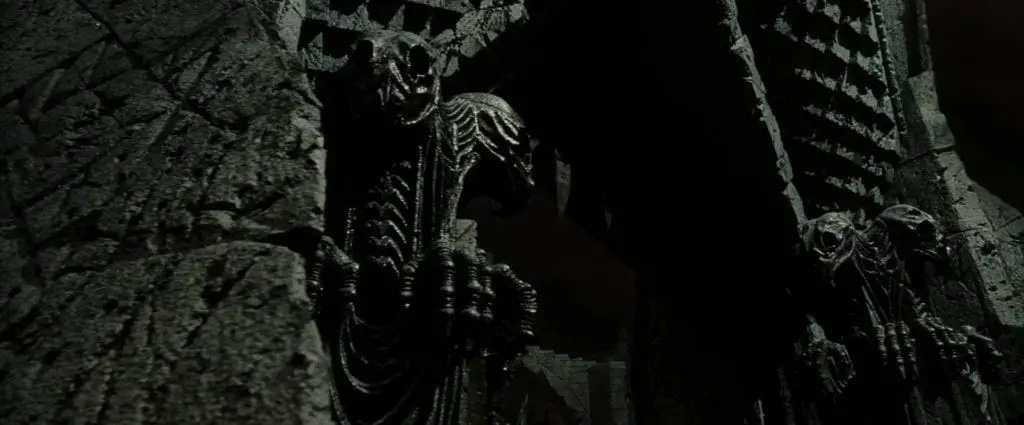“The Tower of Cirith Ungol” shares an unenviable position with “The Taming of Smeagol” and “Minas Tirith” as book openers. They are all responsible for taking a narrative speeding along at full steam, halting it in its tracks, rewinding, and starting something else. It’s a necessity for how Tolkien chose to structure his story but a tricky business, particularly after the strength of Book V. “The Taming of Smeagol” and “Minas Tirith” managed to overcome the disadvantages their positions by introducing a new, immediate dynamism. Smeagol and Gondor reorient both stories, creating near-immediate newness and momentum that propel their books forward. “The Tower of Cirith Ungol” doesn’t do this—we’re at the point for tying up loose ends, not creating them.
That’s for the best, but it does mean that “The Tower of Cirith Ungol” drags a bit as an opener. It’s not bad, by any means—we’ll get to the good stuff in a bit—but it does have a tendency to rehash older thematic and emotional beats that were conveyed more emphatically in “Shelob’s Lair” and “The Choices of Master Samwise.” Sam’s horror at what’s happening is affective, but not new. Evil sowing the seeds of its own destruction is a solid Tolkien theme. But its articulation here—as Shagrat and Gorbag tear each other apart, leaving a clear path for Sam—is more convenient and less potent than in an established, nuanced character like Saruman. And the reminder that Mordor keeps people in rather than out is an ominous one, but again, nothing new.
That said, “The Tower of Cirith Ungol” does have some moments that work really well, and it serves as a nice, tender reminder of how kind Tolkien’s sense of heroism is at its heart.

Visions of Power
“The Tower of Cirith Ungol” is one of the loneliest chapters of The Lord of the Rings. Sam spends the first two-thirds of it, as Tolkien tells us, “utterly alone.” Merry and Pippin have flirted with loneliness earlier in The Return of the King but neither were ever really in a position of comparable isolation. Sam starts off Book VI by walking into Mordor by himself. His panic-induced adrenaline has worn off, and he first catches a glimpse of Mount Doom while standing small, cold, and afraid.
Tolkien repeatedly referred to Sam as the central “hero” of The Lord of the Rings throughout his letters and “The Tower of Cirith Ungol” is right in the middle of the chapters where he most explicitly acts out this role. He just maybe-murdered a giant spider of numinous darkness. He’s storming a presumably orc-ridden tower. He’s about to carry Frodo and the Ring up a mountain. And amid all of this, there’s an interesting examination of what Sam’s heroism is and isn’t. First, there is simply the question of power, as Sam faces his main temptation from the Ring around his neck.
As Sam stood there… he felt himself enlarged, as if he were robed in a huge distorted shadow of himself, a vast and ominous threat halted upon the walls of Mordor. He felt that he had from now on only two choices: for forbear the Ring, though it would torment him; or to claim it; and to challenge the Power that sat in its dark hold beyond the valley of shadows. Already the Ring tempted him, gnawing at his will and reason. Wild fantasies arose in his mind; and he saw Samwise the Strong, Hero of the Age, striding with a flaming sword across the darkened land, and armies flocking to his call as he marched to the overthrow of Barad-dur. And then all the clouds rolled away, and the white sun shone, and at his command the vale of Gorgoroth became a garden of flowers and trees and brought forth fruit.
As in other cases, Sam’s rejection of the Ring requires a voluntary abdication of power, even power with the intention to do good. Gandalf, as Tolkien mentioned, would have been far worse as a master of the Ring than Sauron precisely because of his good intentions. Sam—thanks to that solid hobbit common sense—is able to realize that benevolent garden tyranny is still a tyranny of its own.
The interesting thing about this chapter, though, is that Sam is also repeatedly saved by the power that he abdicates. He knows that “the one small garden of a free gardener was all his need and due, not a garden swollen to a realm.” But at the same time, he is also saved in the Tower by the Ring’s transformation of his appearance into “a great silent shape, cloaked in a grey shadow, looming against the wavering light behind; in one hand it held a sword, the very light of which was a bitter pain, the other was clutched at its breast, but held concealed some nameless menace of power and doom.”
There is a sense of tension present throughout The Lord of the Rings around this question. The peace and simplicity of the Shire, its utter disregard for power and conquest, form the core of hobbit courage. But the question of how—and whether—such things can be maintained without force nearly always bubbles below the surface.
Tenderness and Heroism
Yet despite altered appearances and some surprising handiness in spider fights, Sam’s heroism is of course rooted almost entirely in love. When I read Tolkien as a teenager, I was always aware of a strong contingent of shippers who were deeply invested in the idea of Frodo and Sam being a couple. I doubt this was intentional on Tolkien’s part, if for no other reason than because The Lord of the Rings as a whole is a remarkably asexual work. But I also am not surprised by it in the slightest, because the relationship between Frodo and Sam is intimate and tender in a way that feels unique in the depiction of male fantasy heroes. There is hand-holding, spooning, and so many tears!
He lay back in Sam’s gentle arms, closing his eyes, like a child at rest when the night-fears are driven away by some loved voice or hand. Sam felt that he could sit like that in endless happiness; but it was not allowed.
It’s such a non-toxic version of masculinity that—from my perspective—feels very refreshing. Touch and affection are embraced as healing and strengthening. Tears are a mark of empathy and not of weakness. Sam couldn’t quite pop up on Steven Universe, but it’s also not that much of a stretch.
But now the vision had passed. There was Sam kneeling before him, his face wrung with pain, as if he had been stabbed in the heart; tears welled from his eyes.
After his more traditional heroic role in “The Choices of Master Samwise,” Sam here is heroic in the inverse. He sings, he cries, he hugs, he doesn’t fight anyone. I do wonder, to a certain extent, if Tolkien manages to be so old in his views here that he feels new. In any case, it does feel like another indication of the wobbly foundation for claiming Tolkien as the grandfather of modern fantasy. It’s hard for me to think of subsequent fantasy author who treats emotion in anything approaching a comparable way.

Final Comments
- The first paragraph I wrote for this review described the chapter as “rocky.” It occurred to me that this could be read as a pun in relationship to the landscape, and that seemed so terrible—lampshaded or not—that I just deleted the entire paragraph and started over.
- I’ve always been really into the Watchers and I’d forgotten how small a role they actually play. I apparently just had a thing for frightening boundaries as a child, between this and the Sphinx Gate from The Neverending Story.
- As a kid I also made up a melody for Sam’s song in Cirith Ungol and would sing it to myself when I was by myself because I was a neeeeerrrrrrrddddd.
- I like that Ring-ravaged Frodo is often indistinguishable from a nihilistically-depressed millennial on tumblr: “Here, take this elven-cake, and drink that last drop in your bottle! The whole thing is quite hopeless, so it’s not good worrying about tomorrow. It probably won’t come.”
- Was momentarily but deeply baffled to discover Tolkien talking about the orcs “fighting over the swag” in Cirith Ungol. Swag, though, has a long and fun etymological history you can start reading about here. The use here probably comes from 17th century English thieves’ cant.
- Poor Frodo. He tells Sam that “two great brutes came and questioned me, questioned me until I thought I should go mad, standing over me, gloating, fingering their knives. I’ll never forget their claws and eyes.” Sam, who believes in the power of tears but not psychotherapy, tells his best friend to lock that shit up in his mind vault and never think or talk about it again. No wonder Frodo has to sail off the face of the earth away from his problems.
- Prose Prize: Not a highlight for prose, to be honest. Everything’s perfectly fine but there aren’t a lot of standouts. I do quite like the ending of the chapter though. The drama of what’s occurring pairs nicely with a simplicity of prose. The will of the Watchers was broken with a suddenness like the snapping of a cord, and Frodo and Sam stumbled forward. Then they ran. Through the gate and past the great seated figures with their glittering eyes. There was a crack. The keystone of the arch crashed almost on their heels, and the wall above crumbled, and fell in ruin. Only by a hair did they escape. A bell clanged; and from the Watchers there went up a high and dreadful wail. Far up above in the darkness it was answered. Out of the black sky there came dropping like a bolt a winged shape, rending the clouds with a ghastly shriek.
- Contemporary to this Chapter: Tolkien does it for me this time! He mentions that it is March 14th, just a bit before the Rohirrim arrive at the Pelannor. By the time they leave Cirith Ungol, the Battle of Pelennor Fields is well under way. As with the beginnings of the other books, Tolkien does make some (at least token) efforts to reorient the reader to the new narrative stream.
Art Credits: Film stills are from Peter Jackson’s The Lord of the Rings: The Return of the King (2003), courtesy of New Line Cinema. The painting of Sam approaching Cirith Ungol is courtesy of aegeri.

